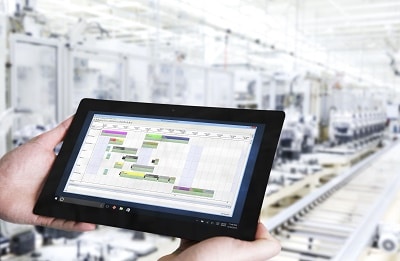 With a history going back to the mid-1980s, Preactor International – now part of Siemens’ PLM software business – has long been a ‘go-to’ company for manufacturers keen to boost factory efficiencies through what we now call Advanced Planning and Scheduling (APS).
With a history going back to the mid-1980s, Preactor International – now part of Siemens’ PLM software business – has long been a ‘go-to’ company for manufacturers keen to boost factory efficiencies through what we now call Advanced Planning and Scheduling (APS).
Simply put, if a manufacturer’s operations were characterised by capacity constraints and bottlenecks—specific pieces of equipment, or tooling, for instance—then Preactor International has been one of a very small number of software companies to offer a cutting-edge mathematically-based finite capacity scheduling and optimisation capability.
Connect it to your ERP’s order book, model the constraints in question, and let SIMATIC IT Preactor APS produce an optimal production schedule, balancing the twin dictates of due dates and capacity availability. A tweak required? A visual interface made minor adjustments a very straightforward affair.
But even so, the latest release of SIMATIC IT Preactor’s APS software is creating more than the usual buzz of interest. It’s the first new release since the business was acquired by Siemens in 2013. With an extensive range of factory optimisation and automation software under the Manufacturing Operations Management (MOM) portfolio, encompassing solutions that address: Manufacturing execution systems, Quality execution, SCADA,
But the benefit has very much been two way, stresses product manager Barney Speller: “The Siemens name has been hugely successful in helping us to penetrate enterprise-level accounts,” he observes. “We’re now part of Siemens’ MOM software portfolio, which enables manufacturers to implement their strategy for the complete digitalization of manufacturing operations.” And that level of interest can only increase, one would have thought, given the changes to the SIMATIC IT Preactor APS line-up that have been revealed by the new release.
SIMATIC IT Preactor APS—to use the new, official branding—does away with Preactor’s old multi-strand product line-up, coalescing the range of solutions around fewer, but more powerful, offerings. In doing so, says Speller, SIMATIC IT Preactor APS has had two goals in mind.
First, no longer is its entry-level solution restricted to scheduling around a single constraint. No more: out of the box, the Standard edition of SIMATIC IT Preactor APS supports multiple constraints, including pieces of equipment, the availability of materials, and additional constraints such as tooling.
Second, while SIMATIC IT Preactor’s higher-end editions have always offered the ability to impose sophisticated programmable scheduling rules, those rules have sometimes been a challenge to implement.
Again, no more. Customisation is still there, but made easier through a range of standard solutions and templates, built-up from over 30 years of understanding how real-life customers use the company’s APS capabilities in practice. Instead of working with text files, users now have a graphical interface with which to fine-tune the system set-up.
In short, concludes Speller, SIMATIC IT Preactor APS under Siemens offers a lower acquisition cost, a lower implementation cost, and a faster time-to-benefit: “The new range delivers a better experience, offers more scheduling functionality at a lower price point, and is a better fit for more manufacturers,” he sums up. “You go live sooner, achieve more, and have a faster return on your investment.”








